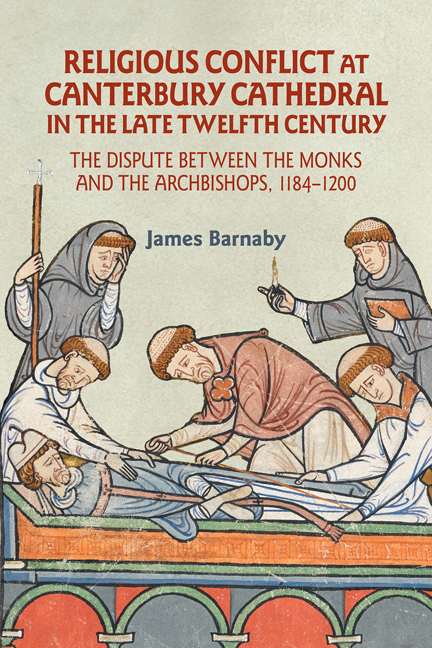 Religious Conflict at Canterbury Cathedral in the Late Twelfth Century
Religious Conflict at Canterbury Cathedral in the Late Twelfth Century Book contents
- Frontmatter
- Dedication
- Contents
- List of Maps
- Acknowledgements
- List of Abbreviations
- Introduction
- 1 The Canterbury Dispute in the Sources
- 2 Baldwin's Grand Plan (1184–November 1186)
- 3 To Rome (November 1186–July 1187)
- 4 The Hackington Dispute (August 1187–September 1189)
- 5 A New King, A Crusading Archbishop, and A Temporary Peace (September 1189–August 1191)
- 6 A New Primate (1191–3)
- 7 The Dispute Renewed (1193–1200)
- 8 After Lambeth: The Dispute in Later Centuries
- Conclusion
- Appendices
- Timeline
- Select Bibliography
- Index
- Other volumes in Studies in the History of Medieval Religion
6 - A New Primate (1191–3)
Published online by Cambridge University Press: 09 May 2024
- Frontmatter
- Dedication
- Contents
- List of Maps
- Acknowledgements
- List of Abbreviations
- Introduction
- 1 The Canterbury Dispute in the Sources
- 2 Baldwin's Grand Plan (1184–November 1186)
- 3 To Rome (November 1186–July 1187)
- 4 The Hackington Dispute (August 1187–September 1189)
- 5 A New King, A Crusading Archbishop, and A Temporary Peace (September 1189–August 1191)
- 6 A New Primate (1191–3)
- 7 The Dispute Renewed (1193–1200)
- 8 After Lambeth: The Dispute in Later Centuries
- Conclusion
- Appendices
- Timeline
- Select Bibliography
- Index
- Other volumes in Studies in the History of Medieval Religion
Summary
With the death of Baldwin in November 1190, the building works at Lambeth stalled. It seemed that no grand new church would be erected. The monks had removed the archbishop's obedientiaries from their positions in the convent and replaced them with their own men, including the replacement of Prior Osbert with Subprior Geoffrey – one of the staunchest and most active defenders of the monastery's rights. The pope had issued mandates, ordering the demolition of all the buildings at Hackington and the confirmation of all his predecessors’ mandates which were favourable to the convent. The monks, it appeared, had achieved victory. Yet the dispute was not just about the building of a church. It was about the monks’ rights vis-a-vis their archbishop. The convent's abilities to appoint their own officers and manage their estates were wrapped up in the controversy over the new church. For the monks only the first stage of the conflict had ended; they now had to fight for their right to elect the new archbishop.
On 10 October 1191, Walter de Coutances, archbishop of Rouen and the king's justiciar, summoned the monks to London for 22 October, to elect a new archbishop. If a free election had been held, the monks would have chosen the bishop of Ely, William Longchamp. William had several points in his favour. As bishop, he was the head of a monastic cathedral chapter and, more importantly, one he was on good terms with. There is no sign that there was any friction between the bishop and his chapter. The monks for example did not object to William installing his brother as prior of the community in 1190. Similarly, upon his death in 1197, the Winchester chronicler felt able to describe Longchamp as the ‘father of monks’. In 1191, Longchamp was also the most powerful man in the realm. As chancellor and justiciar, Longchamp was entrusted with the care of the realm while King Richard was on crusade. Similarly, at the king's request, the pope had made Longchamp papal legate in 1190. Being favoured by both king and pope would certainly have been beneficial to the monks in ensuring the protection of the rights and status of Canterbury. It could also have been a big risk if the archbishop chose to pursue projects opposed by the monks as Baldwin had.
- Type
- Chapter
- Information
- Religious Conflict at Canterbury Cathedral in the Late Twelfth CenturyThe Dispute between the Monks and the Archbishops, 1184-1200, pp. 141 - 152Publisher: Boydell & BrewerPrint publication year: 2024
